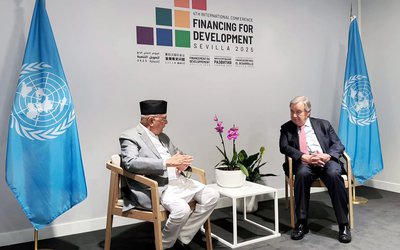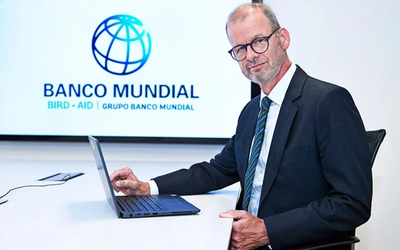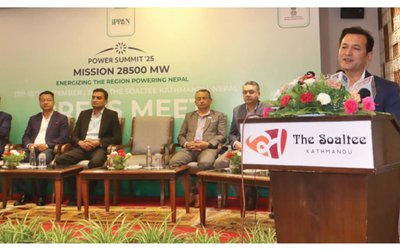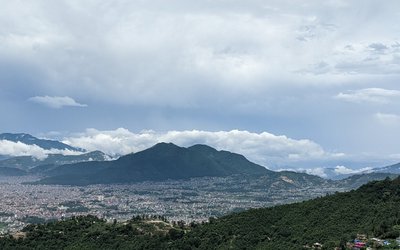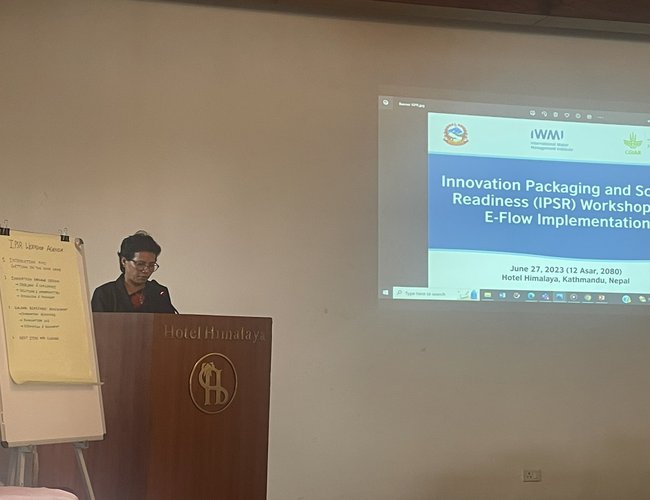
The one-day workshop on Innovation Packaging and Scaling Readiness (IPSR) for E-Flow Implementation in Nepal, organized by the International Water Management Institute (IWMI), completed today.
Dr. Manohara Khadka, Country Representative of IWMI-Nepal, spoke during the workshop about the importance of e-flow in assuring the delivery of ecosystem services in Nepal's river basins. She also emphasized the difficulties in implementing e-flow at the basin scale in Nepal.
"While Nepal's policy landscape recognizes the importance of environmental flow, implementation faces numerous challenges such as limited capacity and a lack of a comprehensive approach to managing e-flow," Dr. Khadka stated.
The major purpose of the innovation packaging and scaling preparedness workshop for E-flow implementation was to to create a tailored innovation package for environmental flow in Nepal.
Tika Ram Baral, Deputy Director General of the Department of Water Resources and Irrigation (DWRI), stated that the collaboration between DWRI and IWMI for the NEXUS Gains program will help Nepal create e-flow norms.
He emphasized the importance of technological interventions and innovations throughout the hydropower development phase for the efficient implementation of e-flow in Nepal.
Dr. Santosh Nepal and Dr. Susanne Bodach highlighted the objectives of the workshop. “The objective of this workshop is to design a context-specific innovation package for environmental flow in Nepal to facilitate scaling. Diverse experts in environmental flow and scaling across various sectors have been invited to collaborate and devise innovative solutions specifically suited to the local context for scaling environmental flow,” said Dr. Nepal.
Dr. Santosh Nepal and Dr. Ram Devi Tachamo Shah, Kathmandu University, presented their study on the state and challenges to environmental flow practices in Nepal..
Dr. Deep Narayan Shah of Tribhuwan University emphasized how different hydropower plants in Nepal practice environmental flow in his article.
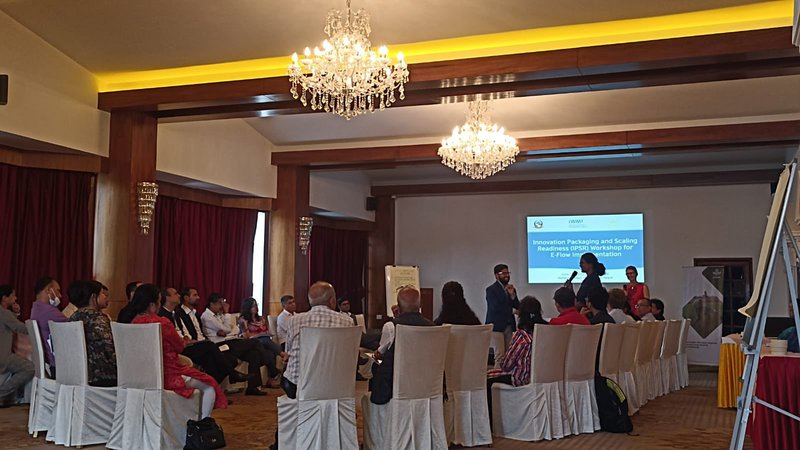
Dr. Susanne Bodach and Dr. Nishadi Eriyagama presented plenary presentation and discussed on innovation description and scaling ambition. Dr. Sanju Koirala, IWMI, highlighted about the issue.
Participants examine the current state of environmental flow practices in Nepal, as well as the challenges they face. Dr. Matthew McCartney also emphasized the seriousness of the issue in Nepal in his closing remarks.
The workshop, which was attended by a variety of experts, government officials, academicians, representatives from Nepal's development partners, experts from IWMI, and NGOs, is part of the NEXUS Gains Initiative, which aims to realize multiple benefits across water, energy, food, and ecosystems in selected trans-boundary river basins by leading global nexus thinking and providing tools, guidelines, training, and facilitation for analysis and research for development.
Although Nepal's policy landscape acknowledges the importance of environmental flow, its implementation faces numerous challenges. These obstacles include the absence of a comprehensive approach, limited capacity, and compliance issues. The NEXUS Gains Initiative is examining these challenges and obstacles to determine the role scaling can play in sustaining environmental flow in Nepal.
Hydropower is an important source of electricity for Nepal and is considered a key parameter for the social and economic growth of the nation. As of March 2023, 140 hydropower projects (HPPs) with a total installed capacity of 2162 MW have been built and 258 HPPs with a total installed capacity of 8685 MW are under construction for fulfilling the demands of societal needs.
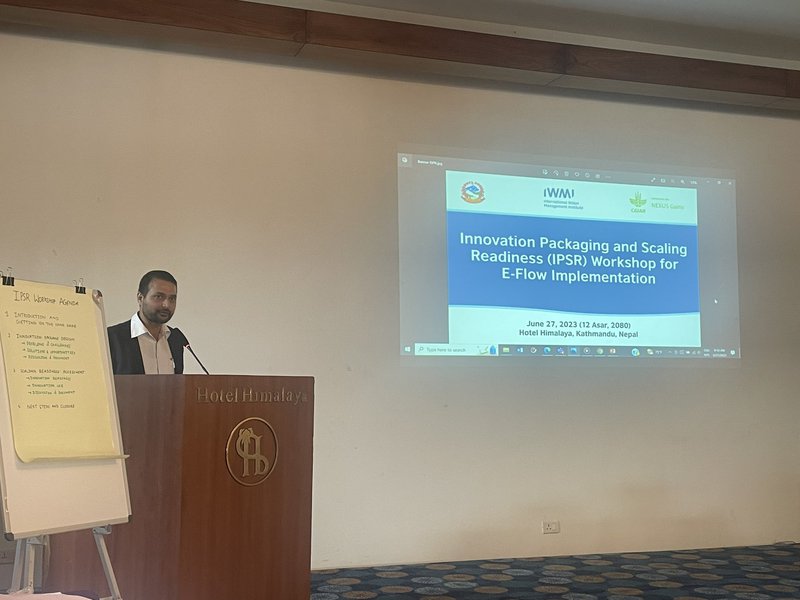
In the operations of HPPs, river water is diverted to hydropower plants and releases very less water to the river channel downstream, which has deteriorating water quality, reducing the water availability, hindering sediment transport, blocking fish migration, and influencing the downstream livelihoods.
This could adversely affect the river’s health particularly when environmental water requirement is not met to sustain the aquatic life and biodiversity of the river ecosystem downstream.
Therefore, “environmental flow (e-flow)” has been envisioned to maintain the river integrity that sustains biodiversity, maintains riparian ecosystems, and preserves the social, cultural, and aesthetic beliefs of people living in the river basins. E-flow, also known as in-stream flow, ecological flow, normative flow, etc., refers to the flow maintained in developed rivers (rivers with hydroelectric projects, irrigation dams, etc.) to maintain a river in a good ecological condition that meets acceptable environmental and societal values.
Maintaining natural hydrological regimes is important for retaining river channel morphology, regulating sediment transport, and allowing fish migration that sustains the ecological integrity of the rivers. In this regard, E-Flow assessment could be an instrumental tool to ensure acceptable levels of flows in the river that preserve biodiversity, maintain ecosystem services including social/cultural services and enhance socio-economic growth.
Although Nepal's policy landscape acknowledges the importance of environmental flow, its implementation faces numerous challenges. These obstacles include the absence of a comprehensive approach, limited capacity, and compliance issues.
The NEXUS Gains Initiative is examining these challenges and obstacles to determine the role scaling can play in sustaining environmental flow in Nepal.
The agenda covers various aspects of innovation packaging, including identifying barriers, challenges, enablers, and solutions. Attendees will participate in plenary presentations, discussions, and breakout group work to deepen their understanding of innovation readiness and use assessments. By the end of the workshop, participants will have a clearer sense of the emerging innovation package and be able to identify priority next steps for scaling the innovation effectively.
.
- Nepal Is Expected To See 60,000 People Infected with Dengue This Year
- Jul 04, 2025
- Journalist Pathak ordered to be released on bail of Rs 25,000
- Jul 04, 2025
- IPPAN To Hold Ninth Power Summit in September: IPPAN President Karki
- Jul 04, 2025
- Weather Forecast: Generally Cloudy Across The Country With Heavy Rain At One Or Two Places In Koshi, Bagmati And Lumbini Provinces
- Jul 04, 2025
- Global IME Capital’s “Samunnat Yojana 2” Mutual Fund Opens for Public Offering from July 6
- Jul 03, 2025




